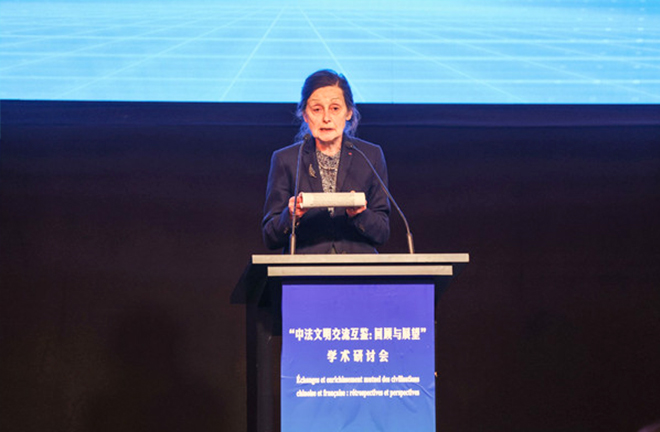Marianne Bastid-Bruguière: Witness to China-France friendship

Marianne Bastid-Bruguière Photo: BUREAU OF INTERNATIONAL COOPERATION at CASS
Marianne Bastid-Bruguière is a renowned French sinologist, a member of the Academy of Humanities and Political Sciences in France, and former president of the European Association for Chinese Studies. Recognized for her contributions, she was awarded France’s highest order of merit, the “Grand Cross of the Legion of Honor.” Professor Bastid-Bruguière was born in 1940 to parents who were both renowned members at the French Academy of Sciences and professors of law. In 1951, at the age of 11, she met Hu Honglie, a Chinese student and protege of her mother, who introduced her to the charm of Chinese culture. Since then, Professor Bastid-Bruguière has been fascinated by Chinese history and language, leading her to study Chinese history as a career and develop a profound relationship with China spanning decades. Throughout her career, Bastid-Bruguière has harbored high hope and unwavering confidence in China’s trajectory. As she remarked in 2015, “I often say that China will rise and one should not assume that China will always lag behind. I’ve been saying this for nearly fifty years, yet I’m still amazed at China’s ever-changing development.”
Professor Bastid-Bruguière is a witness to the establishment and development of China–France relations after the founding of the People’s Republic of China. In 1964, France was the first major Western nation to formalize diplomatic relations with the New China. At that time, Bastid-Bruguière was writing her thesis on modern Chinese history. From 1964 to 1965, she made her first visit to China and worked as a French teacher at the Department of European Languages at Peking University. From 1965 to 1966 she assumed the position of a visiting scholar at the university. Subsequently, she began her academic career in Chinese history research at the French National Centre for Scientific Research. In retrospect, she fondly reminisced that during her time at Peking University, history courses were offered exclusively, but no language courses were available, so she had to rely on dictionaries to build her Chinese proficiency.
Professor Bastid-Bruguière is one of France’s foremost sinologists, with profound knowledge in research areas such as the history of China-France exchanges. In the 1980s, Professor Bastid-Bruguière pointed out that sinological research in Europe should highlight historical continuity, with a keen sensitivity to the characteristics of different cultures, which requires scholars to have a high level of language proficiency. She believed that the study of contemporary China needs to adopt an interdisciplinary approach, integrating methods from history, economics, anthropology, and other disciplines, so as to deepen the understanding of Chinese society with a broad-minded perspective.
Over the years, Professor Bastid-Bruguière has continuously explored the historical bonds of friendship between China and France. It is widely recognized in academia that Europe experienced a “China craze” during the 18th century. Despite changes in European perceptions of China during the 19th century, mutual appreciation and learning between intellectuals of both sides never ceased. Literary giants such as Hugo, Flaubert, Baudelaire, and Maupassant all held a deep interest in Chinese culture and art. Many poets drew inspiration for revitalizing French art from Chinese poetry, including Tang poems. In the meantime, Chinese scholars such as Lin Shu, Liang Qichao, and Su Manshu translated numerous French literary works, which were well received by intellectuals in China.
Professor Bastid-Bruguière is not only a participant but also a diligent advocate of cultural exchanges between China and France. She firmly believes that without the land of China and without the study of the Chinese people, she would have achieved nothing. In the 1960s, during her work and study in China, she formed strong bonds with historians at Peking University. In 1965, she wrote to Mr. Zhang Zhilian, one of the founders of the study of French history in New China and a professor in the Department of History at Peking University at that time, seeking academic assistance. After communicating with Mr. Jian Bozan, a respected scholar, the then director of the Department of History, Mr. Zhang Zhilian invited Mr. Shao Xunzheng, who had studied in France, to be her mentor. Expressing profound reverence and gratitude towards Mr. Zhang Zhilian and Mr. Shao Xunzheng, Professor Bastid-Bruguière attests to their pivotal influence on her academic journey. At a seminar commemorating the centenary of Mr. Zhang Zhilian’s birth in 2018, she lauded his wisdom, cultivation, active spirit, and his mastery of bilingual conversation in English and French. The insights and wisdom imparted by the older generation of Chinese scholars left a deep mark on Professor Bastid-Bruguière’s academic career.
Dedicated to fostering academic exchanges between China and France, Professor Bastid-Bruguière has actively promoted scholarly collaboration since the 1980s. She was appointed as an honorary professor in the Department of History at Peking University and in that capacity delivered lectures in China on multiple occasions. During her tenure as vice president of the Ecole normale supérieure in Paris, she invited many scholars from Peking University to give lectures in France. To this day, Professor Bastid-Bruguière has frequently interacted with several generations of historians in China, particularly those who study French history, while warmly welcoming successive generations of young Chinese scholars for academic exchanges in France.
Edited by ZHAO YUAN

 PRINT
PRINT CLOSE
CLOSE